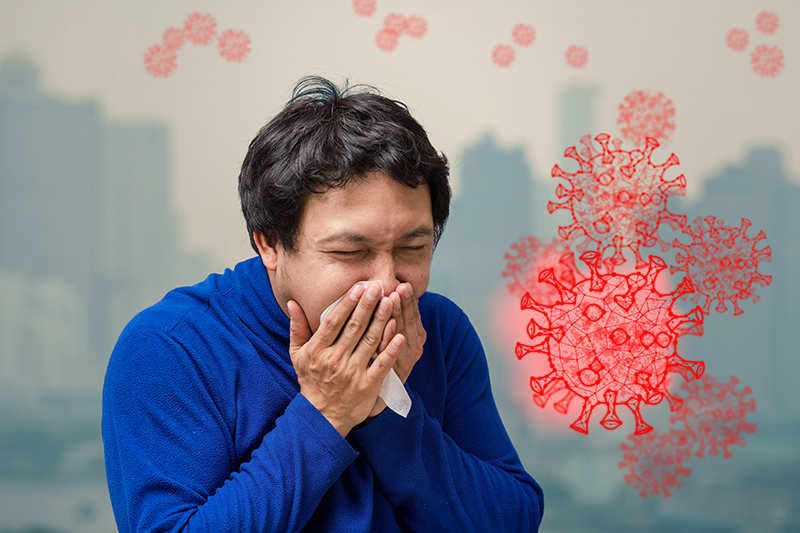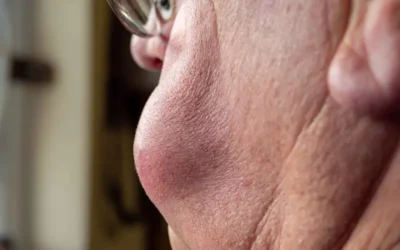Allergic rhinitis, often called “hay fever”, is one of the most prevalent allergy conditions, affecting about 8% of the U.S population and an estimated 10-30% of people worldwide. The most common symptoms involve sneezing, nasal congestions, itchy eyes, stuffy nose and/or sore throat, significantly impacting the individual’s daily life. Proper documentation and accurate medical coding is required for appropriate patient care and timely reimbursement. Using an incorrect or incomplete allergy code can lead to claim denials, delayed payments, or underpayment. Relying on specialized medical billing and coding services can help allergy specialists ensure proper billing and receive accurate and timely payments
This post provides an overview of allergic rhinitis, relevant ICD-10 and CPT codes for the condition, and documentation requirements.
Understanding Allergic Rhinitis
Allergic rhinitis is a medical condition where an inflammatory response is triggered in the nasal passages due to allergens like dust, pollen, fungal spores, animal dander or mold. When individuals with allergic rhinitis come in contact with these allergens, their immune systems react, producing histamines and other chemicals that lead to a variety of symptoms.
Types of Allergic Rhinitis
Allergic Rhinitis is classified as: seasonal and perennial. While seasonal allergic rhinitis occurs during specific times of the year from environmental pollens/climatic elements like dust/snow, perennial allergic rhinitis occurs year-round, triggered by indoor allergens like animal dander, dust etc.
- Seasonal Allergic Rhinitis
- Cause: Outdoor allergens like pollen from plants/trees
- Symptoms: Sneezing, itchy eyes, runny/congested nose and fatigue
- Diagnosis: Analyzing the seasonal patterns and exposure to allergens
- Perennial Allergic Rhinitis
- Cause: Indoor allergens like dust, mites and pet hair
- Symptoms: Similar to seasonal allergic rhinitis but occurring more frequently
- Diagnosis: Symptom review not related to seasonal changes and allergens
Diagnosis and Treatment
Diagnosing allergic rhinitis can be challenging because the symptoms mimic that of other conditions such as frequent colds, or enlarged adenoids in mouth-breathing children. A detailed history and careful physical examination is necessary to identify the type of AR and allergens involved. The following tests are used to diagnose the condition:
- Blood Tests: Calculate the specific immunoglobulin E (IgE) antibodies in the blood, indicating allergy sensitivity.
- Nasal Endoscopy: A visual inspection of nasal passages to find out any inflammation or structural issues.
- Skin Prick Tests: Controlled allergen skin test to analyze the reaction on tissues and body.
- Allergen Avoidance Tests: Assessing symptom relief by reducing exposure to suspected allergens.
Treatments commonly include medications, immunotherapy and lifestyle adjustments.
ICD-10 and CPT Codes for Allergic Rhinitis
- J30: Vasomotor and allergic rhinitis
- J30.0 Vasomotor rhinitis
- J30.1 Allergic rhinitis due to pollen
- J30.2 Other seasonal allergic rhinitis
- J30.5 Allergic rhinitis due to food
- J30.8 Other allergic rhinitis
- J30.81 Allergic rhinitis due to animal (cat) (dog) hair and dander
- J30.89 Other allergic rhinitis
- J30.9 Allergic rhinitis, unspecified
- J31.0 Chronic Rhinitis
- CPT Codes
- 86003 – Allergen specific IgE; quantitative or semiquantitative, crude allergen extract, each
- 86005 – Allergen specific IgE; qualitative, multi allergen screen (eg., disk, sponge, card)
- 86008 – Allergen specific IgE; quantitative or semiquantitative, recombinant or purified component, each
- 9500 – Percutaneous tests (scratch, puncture, prick) with allergenic extracts, immediate type reaction, including test interpretation and report, specify number of tests
- 95017 – Allergy testing, any combination of percutaneous (scratch, puncture, prick) and intracutaneous (intradermal), sequential and incremental, with venoms, immediate type reaction, including test interpretation and report, specify number of tests
- 95018 – Allergy testing, any combination of percutaneous (scratch, puncture, prick) and intracutaneous (intradermal), sequential and incremental, with drugs or biologicals, immediate type reaction, including test interpretation and report, specify number of tests
- 95024 – Intracutaneous (intradermal) tests with allergenic extracts, immediate type reaction, including test interpretation and report, specify number of tests
- 95027 – Intracutaneous (intradermal) tests, sequential and incremental, with allergenic extracts for airborne allergens, immediate type reaction, including test interpretation and report, specify number of tests
- 95028 – Intracutaneous (intradermal) tests with allergenic extracts, delayed type reaction, including reading, specify number of tests
- 95044 – Patch or application test(s) (specify number of tests)
- 95052 – Photo patch test(s) (specify number of tests)
- 95056 – Photo tests
- 95070 – Inhalation bronchial challenge testing (not including necessary pulmonary function tests); with histamine, methacholine, or similar compounds
- 95071 – Inhalation bronchial challenge testing (not including necessary pulmonary function tests); with antigens or gasses, specify
- 95076 – Ingestion challenge test (sequential and incremental ingestion of test items, e.g., food, drug or other substance); initial 120 minutes of testing
- 95079 – Ingestion challenge test (sequential and incremental ingestion of test items, e.g., food, drug or other substance); each additional 60 minutes of testing (list separately in addition to code for primary procedure)
- 95115 – Professional services for allergen immunotherapy not including provision of allergenic extracts; single injection
- 95117 – Professional services for allergen immunotherapy not including provision of allergenic extracts; 2 or more injections
- 95144 – Professional services for the supervision of preparation and provision of antigens for allergen immunotherapy, single dose vial(s) (specify number of vials)
- 95145 – Professional services for the supervision of preparation and provision of antigens for allergen immunotherapy (specify number of doses); single stinging insect venom
- 95146 – Professional services for the supervision of preparation and provision of antigens for allergen immunotherapy (specify number of doses); 2 single stinging insect venoms
- 95147 – Professional services for the supervision of preparation and provision of antigens for allergen immunotherapy (specify number of doses); 3 single stinging insect venoms
- 95148 – Professional services for the supervision of preparation and provision of antigens for allergen immunotherapy (specify number of doses); 4 single stinging insect venoms
- 95149 – Professional services for the supervision of preparation and provision of antigens for allergen immunotherapy (specify number of doses); 5 single stinging insect venoms
- 95165 – Professional services for the supervision of preparation and provision of antigens for allergen immunotherapy; single or multiple antigens (specify number of doses)
- 95170 – Professional services for the supervision of preparation and provision of antigens for allergen immunotherapy; whole body extract of biting insect or other arthropod (specify number of doses)
- 95180 – Rapid desensitization procedure, each hour (e.g., insulin, penicillin, equine serum)
- 95199 – Unlisted allergy/clinical immunologic service or procedure
Documentation Details to Include
Proper documentation is key for ensuring accurate coding and billing. Therefore, providers must ensure the following details are present:
- Clearly specify the type of rhinitis (allergic rhinitis, in this case)
- With asthma
- Not as vasomotor or seasonal type
- Specify the trigger(s) of allergic rhinitis:
- Pollen
- Hay fever
- Pollinosis
- Seasonal allergies
- Food
- Animal (cat/dog) hair and dander
- Other specified allergic rhinitis (perennial)
- Note patient’s use of or exposure to tobacco/tobacco smoke:
- Environmental tobacco smoke
- History of tobacco use
- Occupational exposure
- Tobacco dependence
- Tobacco use
- Diagnoses: Include tests conducted such as skin prick test, blood test etc.
- Treatment Plan: Mention the prescribed medication and treatment plans.
Outsource Medical Billing: Ensure Accurate Claim Submission
Allergic rhinitis requires a calculated approach in diagnosis, treatment and coding to ensure patients receive proper care and providers receive timely reimbursement.
Selecting the correct ICD-10 code is crucial for accurate reimbursement, such as using J30.1 for pollen-induced rhinitis or J30.81 for rhinitis caused by animal dander or hair. It’s also important to differentiate between the codes for single and multiple immunotherapy injections. Providers must be aware that billing for antigen units can vary by state and payer. Ensuring all serum limits are properly accounted for and reimbursed is vital. Avoiding under-reporting is essential to ensure accurate billing and proper reimbursement. As physicians focus on diagnosing and treating allergic conditions, outsourcing billing and coding tasks to a reliable provider of medical coding services can ensure accurate claim submission for optimal reimbursement.
Stay Compliant and Improve Patient Care
Our expert team will take care of your medical coding & billing services!




